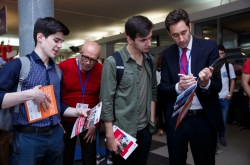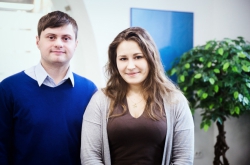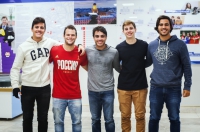Alexandra Predeina: Universidade Federal Fluminense (UFF), Niterói, Brazil
Universities in Brazil are eager to take in exchange students; perhaps because there are fewer applicants compared to Western Europe. I’ve been on an exchange trip before, in my third year, when I spent a semester in France, and this time around I decided to go to Brazil. For safety reasons, exchange students to Brazil are usually sent in groups, so I went to UFF with two other students from ITMO University, and I must say that it would have been harder if I went alone.

Niterói is part of the Rio de Janeiro metropolitan area; its citizens consider themselves a part of Rio, which the citizens of Rio hate. UFF is the largest institution in Niterói with nearly 20 campuses. They have lots of educational programs on everything from indigenous African dances to biomedicine, which is the program I picked.
Practically everything about Brazil was a surprise to me. It’s a completely different world; even the seasons don’t match! How well you do on your studies depends greatly on your professor: some are very open and will talk to you about anything, but there are also those who are very hard to get to. English isn’t very popular in Brazil even though it’s easier to learn it there than it is in Russia.

Exams aren’t very difficult if you’re an international student, as most of the teaching staff are eager to share their experience and don’t go too hard on you. My classmates were mostly Brazilian; the only international students were the ones from ITMO and a student from Serbia. We must have been the first foreigners to study in the biomedicine program at UFF. Most international students come here to learn Portuguese or international relations.
The international student community at UFF is well-organized, and we had a Facebook group where we shared information about events in Rio de Janeiro and found friends with common interests. For example, I joined a hiking group and spent my free time trekking in the mountains with other students.

Brazilians are very open and there are no half-measures to their behavior: they either love or they hate. Their perception of time is different, too: they’re late 15 minutes to meetings and classes, 30 minutes late to meet-ups with friends, and if you are invited to a party or a wedding, you should be late at least 2 hours. It was tough getting used to that, but we adjusted.
The carnival is a crucial part of their lives. Technically, it starts in March, but celebrations begin in January. Having people walk around near-nude and covered in feathers and glitter is perfectly normal in that season. Pre-carnival parties happen once a week in January, and by the time March rolls around, there’s one every day. Carnival crowds move from one place to another, and if you’re not there at the start, you’ll also have to figure out where to catch up to them.

The stipend we received as exchange students was quite sufficient to live comfortably. It’s somewhere around 30,000 rubles and that was enough for Niterói. I paid 10,000 for rent because I rented a large room together with two other ITMO students instead of living on campus. It wasn’t that easy to find a room because the locals rarely speak English, so we had some staff from UFF give us a hand. The food prices are pretty much the same as in Russia, although meat and dairy are somewhat pricier.
One thing you have to be ready for in Brazil is having your pocket picked. It’s better to have two phones: one for constant use and another in case the other one gets stolen. It’s also wise to watch out for credit card scams and make sure you trust the bank whose ATM you’re using.
Sofia Butonova: University of Chemistry and Technology, Prague, the Czech Republic

When I was choosing where to go on exchange, my main criterion was its location. It was important to me that the university would be in a major city. I’ve spoken to Europeans who study in small towns and they all said that living there can be a bit depressing, and that’s why I was looking for capital cities.
The University of Chemistry and Technology is one of the top Czech universities, but I wouldn’t say there’s something special about it from the academic point of view. I chose it for its scientific profile: my program at ITMO University isn’t in the university’s main subject area, and I hoped to go somewhere with a focus on chemistry to learn about this subject. Even though the university doesn’t get the best funding and some labs may lack equipment, there are some really great professors. Our Organic Chemistry professor was a true enthusiast and infected us with his fervor. This was a subject for Master’s students and there were only six of us in a program made specifically for international students.

During my time in Prague I had to acquire 28 credits, and so I took 6 courses with 4 days of classes. I can’t say I was under a heavy load. In my free time, I could go to student parties or trips. There’s an organization called ESN that sets up various tours and cultural events for international students. I didn’t go on any of their trips, but I did attend some of the meet-ups where you can meet new people and learn something useful.
The university gave me an option to live in a dormitory, which I accepted. I shared a two-bedroom place with a girl from Croatia. By Prague standards, the campus was quite far from the university, and it took me about an hour to get to class.

The cost of living in the Czech Republic isn’t very high, enough to live on a student stipend. I paid 10,000 rubles for the dorm; the public transport there is three times cheaper than in St. Petersburg, but the food is a bit more expensive.
In Prague, you have to adjust to a slow pace of life. It’s not out of the ordinary to see people with glasses of wine and beer at 9 AM. There’s even a bar serving alcohol right on the campus, and people treat beer like water, drinking it anywhere and anytime.
Ekaterina Grigoryeva: Vrije Universiteit Brussel, Brussels, Belgium

The Free University of Brussels is a lot like ITMO University in that the staff and students don’t shy away from unorthodox approaches, they try to be dynamic, modern and to create an interesting environment for everyone. I studied in the Master’s program on molecular biology. The courses I chose were very different from each other and not very related to what I study back home, but to me, this trip was a way to prepare for my future Master’s studies.
I had to get 30 credits in eight subjects, so I was quite busy with studies. There was a lot of practical work, which was my first such experience. Other students were very responsible, sensible people aged 25 to 36, all from different countries.

Studying was tough, at least in the beginning. My program barely overlapped with my academic background and many things were new to me, but the other students helped me out. It turned out that many of my peers had a great deal of experience with internships and projects like the one we worked on in Brussels.
The university campus there is very extensive: there are academic buildings spread all over the premises, one massive building is a library, then there’s the Study and Guidance Center, where students come to work together, sports facilities, a restaurant, a cafe, a massive park, and even the dorms.
Despite being in the very heart of Europe, there isn’t much in terms of partying in Brussels, which is strange. Student residences are really popular, and even those who don’t live there can come to the parties.

Life in Brussels isn’t cheap. It’s a challenge to find a place at the campus dorms as an exchange students, as the priority is given to those who came for long-term studies. At first, I rented a room for 600 euros, but then I moved to another room where I paid 450 euros. The average price of rent on the campus is about 400 euros.
It can be tough to live in Belgium on an exchange student’s stipend, so you also need additional income. I spent about 60,000 rubles per month on average, although I have to mention that I did travel a lot, to places such as Amsterdam, Luxembourg, and small towns in France and Germany. One really great thing about studying in Europe during winter is that you get to visit the spectacular Christmas fairs.





